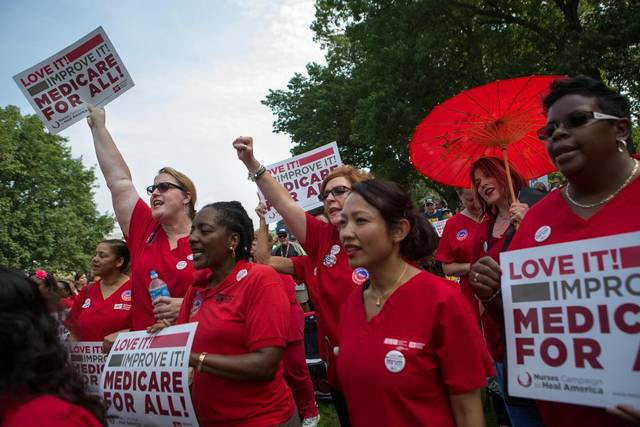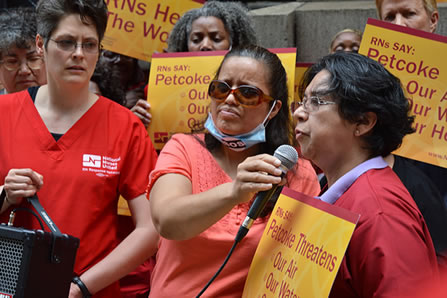This guest blog post was written by Alexandra Griffin, a participant in the 2015 Fossil Free Fellowship.
“What’s a nurses’ union doing working on environmental justice issues?” is a question I’ve received often when people ask about my work this summer at National Nurses United (NNU) with 350.org’s Fossil Free Fellowship. There’s a widespread perception that unions are concerned solely with their immediate economic interests, like higher wages, better working conditions, job security. And for many unions, this holds true. It’s a testament to the rise of business unionism over the past half century and the decline of a revolutionary labor movement. But some unions, including NNU, practice what is known as “social unionism,” in which workers and their unions mobilize around issues that affect their communities more broadly, such as healthcare, better schools, and environmental justice.
And they’re a powerful force: nurses organizing gave us mandated registered nurse-to-patient ratios, improved protections for women survivors of domestic violence. Nurses have fought for the Robin Hood tax, a tax on Wall Street financial transactions, and stood with the Occupy movement. Nurses are also at the forefront of the fight for healthcare as a human right — and this July, nurses in Chicago and around the country mobilized to celebrate Medicare’s 50th anniversary, and demanded it be protected, improved, and expanded.
When it comes to fighting for environmental justice, nurses see firsthand the harmful impacts of the fossil fuel industry on public health, in their patients or in their own communities.
Nurses that I spoke to this summer told me that for them, environmental justice activism is, in part, an extension of their patient advocacy. They advocate for their patients at the bedside, but they also advocate for the health of their patients’ communities more broadly — and they understand climate change and the fossil fuel industry to be an enormous threat to this. In 2014, hundreds of nurses marched to ban Keystone XL, a pipeline which would threaten the health of communities across the country.
Rolanda Watson, a Chicago-based nurse, started working on environmental justice issues with National Nurses United after she was working in clinic during a huge dust storm of petcoke in the south side of Chicago in 2013. This petcoke, a byproduct of oil refining, was a hazardous dust dumped in the south side of Chicago without adequate protection by one of the Koch brothers’ companies, KCBX. Some of this oil is extracted from the tar sands in Alberta, Canada, harming the land and health of indigenous people, and then travels south to be refined. The petcoke byproduct was dumped in the south side of Chicago. It is a toxic chain of environmental racism and exploitation of communities, perpetrated by the fossil fuel industry.
Incredible organizing by community residents in the Southeast Side Coalition to Ban Petcoke and the Southeast Side Environmental Task Force have compelled the municipal government to place regulations on the petcoke piles, which KCBX continues to evade. NNU has worked with these community organizations as they continue to fight for a full ban on petcoke, and supported nurses, like Rolanda, who understand the health impacts of the issue from firsthand experience, to speak out about the issue. To support their work, donate to the South Side Environmental Task Force here.
I was surprised when I found out that I would be working with a union through 350.org. I knew about the fraught history of labor-environmentalist relations, one that is built upon a false dichotomy of environment versus jobs. Even today, this keeps some trade unions fighting for the construction of new fossil fuel infrastructure in the face of a climate catastrophe.
What we need is a just transition to more clean jobs — solutions, created and implemented by communities, which forestall catastrophic climate change without harming the people that depend on these industries for jobs. Whether it’s providing political education to their workers, organizing marches and strikes, drafting legislation and lobbying politicians, or supporting community organizations who are building solutions to this crisis, organized labor must play a role in facilitating this transition.

